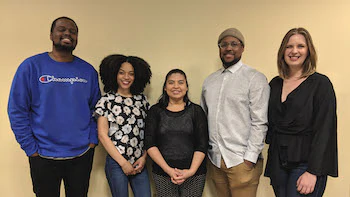Published 2019
Deceptions Program

“The thing I liked best about the Deceptions curriculum is how it showed you that it may not be plainly obvious what’s happening. I didn’t know that it’s not exactly black and white. A lot of it isn’t something you thought would be trafficking. It can be anyone.”
- Deceptions participant
Program Description
Through classroom lessons, one-on-one coaching, trauma-recovery and empowerment groups, and parent participation, the Deceptions program teaches students how to recognize and avoid sex trafficking and helps them build protective factors, including self-efficacy and healthy relationship skills. Northwest Family Services and their evaluation partner are working to test and evaluate the Deceptions Program model.
Program Snapshot
- Population: 7th-grade students, primarily Latino
- Location(s): AZ Multnomah and Clackamas Counties, OR
- Partners: The Sexual and Reproductive Health Coalition for Clackamas County
Goals
- Teach students to recognize and avoid sexual coercion, including child sex trafficking
- Prevent teen pregnancy by increasing students’ protective factors, including self-efficacy, connections to resources, and healthy relationships skills
Strategies
Classroom lessons
Prevention specialists deliver the Deceptions curriculum through six 45- to 50-minute classes at six middle schools in the Portland metropolitan area. Through videos, discussions, processing activities, and skill-building exercises, the classes teach students about sex trafficking, healthy relationships, internet safety, refusal skills, consent, and other topics. The classes center around a video series in which a survivor of sex trafficking tells her story and explains the dangers of sex trafficking and how to avoid it.
Coaching and resource referral
Students who are struggling academically or behaviorally at school, have a history of trauma, or lack a caring adult in their life are referred by counselors or can self-refer to receive one-on-one coaching. Prevention specialists set goals with students in areas such as grades, attendance, and behavior; work with students to identify and overcome barriers; and follow up as appropriate to support students’ progress. Prevention specialists also connect youth to resources that can help them meet their goals, including housing, health insurance, medical and dental care, and mental health assessment and treatment.
Trauma-recovery and empowerment groups
Prevention specialists lead trauma-recovery and empowerment groups of eight to ten students, meeting once a week for sixteen weeks. The groups are closed (no new students may join after the third week) and are all-male or all-female, providing students with a safe space to develop relationships, share their experiences, and support one another. Guided by the prevention specialists, students discuss emotions, trust, and self-efficacy, reflecting on their goals and how they can achieve them.
Parent participation
Parents of children participating in Deceptions classroom lessons receive a letter with an overview of the content and questions for parents and students to reflect on together after each class. Some parents also receive text message or email reminders on the day of each lesson. Prevention specialists contact the parents of students who receive one-on-one coaching or are in the empowerment groups to discuss ways that parents can support their children. Program staff also host two-hour workshops several times a year to teach parents the Deceptions curriculum content and raise awareness about sex trafficking.
Stats at a Glance
- 944 Number of students who received classroom lessons (December 2018-June 2019)
- 64 Number of students who received one-on-one coaching (January 2018-June 2019)
- 94% Percentage of participants surveyed who agreed or strongly agreed that the presenter gave them a clear message about knowing and avoiding “trafficker” methods
- 89% Percentage of participants surveyed who agreed or strongly agreed that the information presented helped them understand the difference between healthy and unhealthy relationships
Grantee Information
Amy Simmons
Deceptions Program Manager
971-254-0198
asimmons@nwfs.org
https://www.nwfs.org/deceptions
Print the full success story here.
About the TPP Program
The Office of Population Affairs (OPA) Teen Pregnancy Prevention (TPP) program is a federal grant program that funds diverse organizations working to prevent teen pregnancy across the United States. OPA invests in both the implementation of evidence-based programs and the development and evaluation of new and innovative approaches to prevent teen pregnancy. The OPA TPP program reaches adolescents ages 10-19, with a focus on populations with the greatest need in order to reduce disparities in teen pregnancy and birth rates.
 An official website of the United States government
An official website of the United States government
